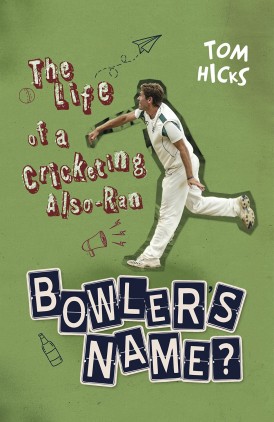Bowler’s Name: The Life of a Cricketing Also-Ran
Martin Chandler |Published: 2021
Pages: 352
Author: Hicks, Tom
Publisher: Pitch
Rating: 3.5 stars

In recent years there have been some very well received books written by club cricketers that have also sold well. Generally a mixture of humour and descriptions of the sort of cricket and cricketers that everyone who has played the game can identified with they have not, I must confess, greatly enthused this reviewer. I have enjoyed some of what I have read, but they are books I always struggle to get in to, and seldom finish.
My personal preference is always to read about the career of a First Class or Test cricketer, and their stories of lives and matches well above the level that I could ever aspire to being involved in. In the circumstances Bowler’s Name: The Life of a Cricketing Also-Ran was not a title that really appealed to me, and had it not been published by Pitch it is quite possible that I might not have looked beyond the fact that I did not recognise Tom Hicks’ name, and consigned this one to a place so far down the pending pile that I would know that, in truth, I would almost certainly never get round to reading it.
Having opened the book however I did not have to read very much in order to realise that Tom Hicks is not quite what he seems. His may not be a household name, but he has played a decent standard of cricket, and whilst his record in nineteen First Class appearances is far from stellar he twice got to fifty with the bat and, with his off spin, managed a couple of five-fers as well. All of those matches were played between 1999 and 2002 and were for Oxford and other university sides. Before, during and after that he also spent eighteen summers playing a good standard of club cricket, and for Dorset in the Minor Counties Championship.
On the whole Hicks’ life story is told in an entertaining and self deprecating fashion. He clearly was a batsman who could hit the ball off the square, and a bowler who could spin the ball, although he sometimes tries to give the impression he could do neither. He did have one trial for a First Class county, Worcestershire, and that forms the basis for one the interesting stories that he tells.
A good deal of the book dwells on Hicks’ time at University and that aspect of the First Class game in England, which was reaching the end of the line at the time. It is more than interesting. The interactions with the full time pros that the students came up against are illuminating, and there is a particularly enjoyable passage that deals at some length with one of the pinnacles of Hicks’ career, an appearance for a British Universities XI against the 1999 New Zealand tourists. The match was an opportunity for Hicks to rub shoulders with the likes of Stephen Fleming, Nathan Astle and Daniel Vettori for three days on his home pitch. There are good accounts too of Hicks’ four Varsity matches which included, in 2000 with him as Oxford captain, the last occasion on which that famous fixture was played at Lord’s.
Following on naturally from the above observation is the undeniable fact that Hicks has played against a number of top class cricketers, and on the same side as a few as well. His views on the best batsmen he has seen are interesting, and on the fastest bowlers. He comes to no view as to a single best batsman, although he clearly rated Robin Smith very highly. As for the speed merchants the name of Simon Jones frequently appears in that chapter, although in the end for sheer pace Jones is bested, perhaps slightly surprisingly, by Fidel Edwards.
In the book Hicks also spends some time looking at his experiences with his various clubs and with Dorset. There is the occasional serious story, but generally he sticks to those with an element of humour. I particularly enjoyed his descriptions of an experience of staying in Neath, which certainly falls into the latter category. At the other end of the scale Hicks’ analysis of the difference between skippering First Class sides, where a captain needs primarily to be a good tactician, as opposed to leadership in the lower echelons of the game, where man management is a much more important skill, was a thought provoking one.
Outside cricket Hicks has found gainful employment as a schoolmaster, variously at Uppingham College and after that Wellington College where he encountered and no doubt contributed to the development of the Curren brothers. More recently, just last year in fact, he has made the decision to relocate to Hong Kong of all places where, five years after he decided to listen to his body’s protests and give cricket up, he has started playing again. He mentions the move East in a very brief postscript thereby neatly setting up, if freedom of expression survives in that location, the opportunity for a second volume of autobiography in a few years time. In the meantime, and I cannot imagine any basis upon which the Chinese authorities would object to this one, I hereby extend an invitation to Hicks to contribute a piece to A Bibliophile’s Blog on the subject of Tim Bunting’s cricket library, a 39,000 volume nirvana for collectors of cricket books and memorabilia, which I see he has been fortunate enough to visit.






Leave a comment